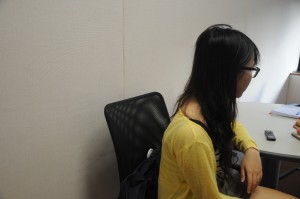However, there is some evidence that the problem is widespread and there is a need to legislate. In October 2011, the Association for the Advancement of Feminism (AAF) published the “Survey on the Body Labouring of Young Women and the Sexual Harassment in Workplace”. (“Body labouring” is a term used to describe women whose work brings them into contact with the public and often leaves them vulnerable to sexual harassment) In the survey, AAF interviewed 203 women aged between 16 and 25 who were uniformed service providers such as flight attendants, beer promoters and waitresses. Nearly a third of the interviewees said that they had experienced sexual harassment by customers.
Without protection under the law, what non-governmental organisations can do to help is limited. “For other cases, we can make suggestions on how you can file a complaint to the EOC and what ordinances you can refer to in your complaint…we can accompany you to the EOC and follow up the case together, but we cannot do it in this situation,” says Jodie Hui Pui-lam, the AAF’s coordinating officer.

Without the help of the non-governmental organisations, victims may seek help from their employers. However, many companies do not provide clear guidelines on handling sexual harassment from customers.
Julian Yau Chi-hung, the external vice-chairman of the Cathay Pacific Airways Flight Attendants Union thinks that the guidelines for front-line employees on how they should handle incidences of sexual harassment from passengers are inadequate. “They only tell us you need to report to your supervisor or call the police, they do not mention if we should make a record of it or ask for a witness,” he says.
Jenny Ho Kit-man, an executive committee member of the union, thinks companies are not motivated to provide clearer guidelines because the ordinance does not cover employees. “[They think] there are no protections so why should I do anything? It wouldn’t help you anyway,” says Ho.
Even when there are guidelines, they do not apply to all work scenarios. When 20-year-old Louisa Chan Lok-yee faced sexual harassment during her nursing internship, she was frightened and at a loss as to what she should do. In school, Chan had learnt how to avoid complaints of sexual harassment from patients but she was not taught what to do if the tables were turned.
On the second day of Chan’s internship, she and her classmate were assigned to change the diapers of the male patients. A 50-year-old patient asked Chan to clean his genital area although he did not need to change his diaper. Chan resisted at the beginning but agreed after the patient’s repeated requests. As she did so, the patient had an erection. “We were frightened, we asked him if we had hurt him but he said ‘No, it feels good and please continue’ but we felt really embarrassed,” says Chan.
Chan reported the incident to her teacher at the school of nursing but the teacher neither took further action to assist her nor provided her with advice on how to handle similar cases.






































